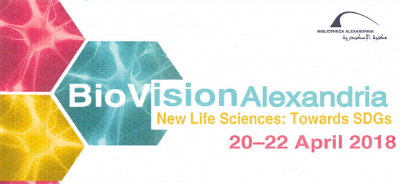


The ninth BioVision Alexandria international life sciences forum has just concluded in Alexandria, Egypt, with significant input from IAP.
This year’s edition of the event that is held every two years was bigger than ever – featuring 109 speakers from 27 countries and some 2,762 participants, many of them young women scientists from Egypt.
The theme of the conference was ‘New Life Sciences: Towards the SDGs’ and the mixture of plenary and parallel sessions ensured that many of the 17 SDGs were discussed in some detail.
IAP was central to the session on ‘Science Academies: Supporting the SDGs’, with Peter McGrath, IAP coordinator, presenting on how IAP activities are addressing various of the SDGs. In particular, he focused on SDG #4 (Quality education) and how IAP’s Science Education Programme is answering the challenges therein. Other speakers in the session, which was chaired by former IAP president Mohamed Hassan, were Sameh Soror (former GYA co-chair), who spoke on the IAP projects directly aimed at building the capacity of academies to address the SDGs in their countries – Soror is a member of the working group of one of these projects – and Stanley Maphosa (ASSAf), who provided a perspective from a national academy’s point of view.
ASSAf executive officer Roseanne Diab presented in the session on ‘Sustainable Development: Saving our planet’, while ASSAf co-organized a session on ‘How open data can contribute to achieving the UN SDGs’.
Peter McGrath also acted as a rapporter for the ‘Food and Agriculture’ stream, which involved three sessions and a strong focus on the work and influence of M.S. Swaminathan in the Green Revolution. In his report in the closing plenary session, McGrath was also able to highlight IAP’s Food and Nutrition Security and Agriculture project.
Mahmoud Sakr, president of the Academy of Scientific Research and Technology (ASRT), IAP’s member in Egypt, closed the event providing information about ASRT and its main activities. “As an academy of science and also a science funding agency of the Egyptian government, ASRT plays a crucial role for science in the country,” explained Sakr. In particular, ASRT seeks to build links between the research sector and industry; supports scientific exchanges, including a new programme with the Bibliotheca Alexandrina for PhD students from other countries (at least 10 per year from Africa) to study in Egypt; and promoting responsible and ethical research practices.
All presentations will shortly be available on the BioVision Alexandria website.